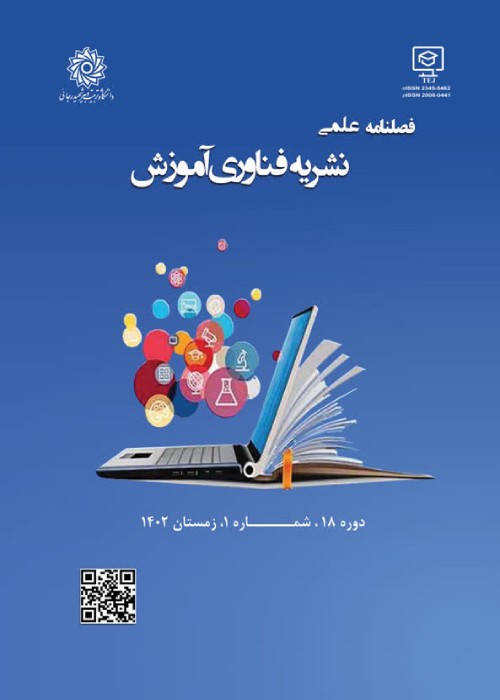The role of self-directed learning in the effectiveness of e-learning during the COVID-19 pandemic
One of the most crucial objectives of education systems is to respond to students' learning, social and emotional needs, particularly in critical situations. Over the past two years, the coronavirus pandemic (COVID-19) has been one of the most significant recent crises in education systems. As a result, most educational institutions are temporarily locked out, and many turn to e-learning. Although e-learning for some reasons such as; easy access at any time and place and reducing stress in the Covid-19 are gaining popularity; however, criticisms such as weaknesses in student evaluation, harm interpersonal communication and its reduction, have been caused that receiving opinions, lived experiences and stakeholders' perceptions about the quality of teaching-learning in universities and evaluating its effectiveness has become one of the essential concerns for core stakeholders of education systems. If the teaching-learning process is not practical, it may affect students' sense of belonging to the university, their sense of worth, and even their mental and physical health, so evaluating the effectiveness of teaching-learning (especially in the electronic environment) situations is more important. It can reduce some of the challenges we have today. Therefore, to evaluate the effectiveness of the process in the electronic environment, it is necessary first to define the concept and then identify the primary and critical factors affecting its successful implementation. At the same time, we live in an age where we deal with a huge bulk of knowledge and information. Everyday technological advances are increasing; consequently, teacher-centred education systems are no longer able to meet the learning needs of students. Therefore, paying attention and reinforcing the individual skills of learners such as self-monitoring, self-assessment, self-directed learning leads the individuals to pursue and learn what they need to know. Therefore, given the problem and its importance, this study was conducted to explain how effective e-learning based on self-directed learning was in the pandemic Corona crisis.
The research methodology is applied in terms of objective, and representations of data collection are descriptive-correlational. The study population consisted of all graduate students from the University of Tehran who studied between 1399 and 1400. Using the Cochran formula and stratified random sampling, 377 persons were selected as the statistical sample. The tools for collecting the required data included the elf-directed Learning Questionnaire and the e-learning effectiveness questionnaire. Content and construct validity were used to evaluate the e-learning effectiveness and self-directed learning questionnaire. The results showed that the model had a good fit. Finally, to analyze the data in the present study, t-test (to determine the status of research variables), Pearson correlation coefficient (to examine the simple relationship between research variables), stepwise regression, and finally confirmatory factor analysis (for validity), Structure and explanation of the role of variables) were used.
The results showed that 1) the self-directed learning and effectiveness of e-learning status are higher than average from the students' point of view. Among the components of self-directed learning, learning, motivation has the highest value, 2) self-directed learning and its components have a positive and significant relationship with the effectiveness of e-learning. Among the components of self-directed learning, learning motivation, planning, and executive abilities are the most related ones to the effectiveness of e-learning, and finally 3) the result of stepwise regression indicates that self-directed learning and its components can explain about 30% of the effectiveness of students 'e-learning.
Therefore, since self-directed learning is an essential factor in learning effectiveness and improving the quality of students' learning in e-learning, students' self-direction programs can be strengthened in the form of strategies such as self-management training, self-regulation, increasing learning motivation, management, and planning in the implementation of teaching-learning activities in the e-environment and interpersonal communication skills and student interaction and participation. Learners who regulate their learning with specific targeting, monitoring, and planning strategies are better developed and more effective, but this seems more important in the e-learning environment. Perhaps this is because, in the e-learning environment, the learner is more responsible for his learning than in any traditional learning environment and should have more self-control and management.
- حق عضویت دریافتی صرف حمایت از نشریات عضو و نگهداری، تکمیل و توسعه مگیران میشود.
- پرداخت حق اشتراک و دانلود مقالات اجازه بازنشر آن در سایر رسانههای چاپی و دیجیتال را به کاربر نمیدهد.




